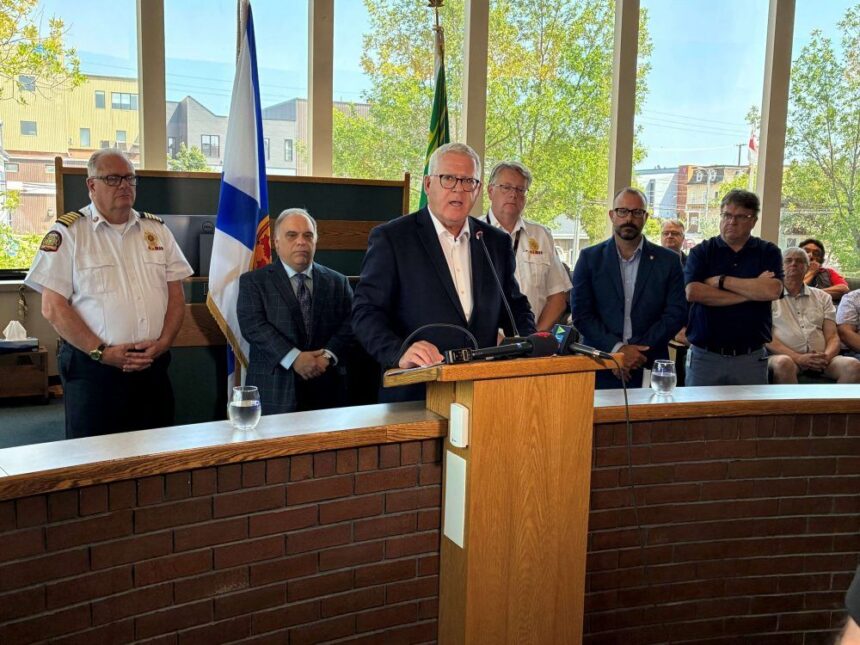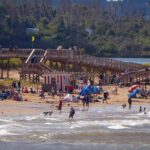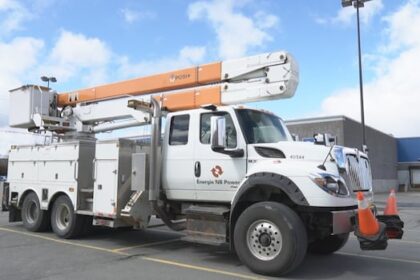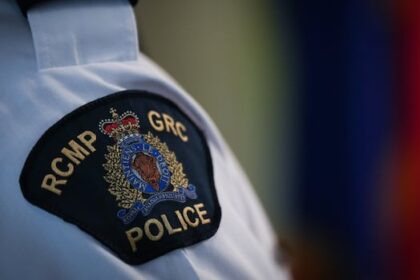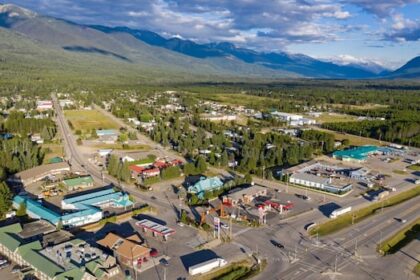Article content CBRM Mayor Cecil Clarke, centre, announces that CBRM has issued a voluntary water conservation advisory amid a spell of hot weather and no precipitation. Joining Clarke are, from left, regional fire chief Mark Bettens, chief administrative officer Demetri Kachafanas, manager of emergency management Bruce MacDonald, Ray Boudreau, CBRM’s director of water and wastewater, and public works manager John Phalen. Photo by IAN NATHANSON/CAPE BRETON POSTArticle contentSIGNIFICANT DIFFERENCEArticle content“What we’re asking residents to do is to reduce non-essential water use wherever possible, including on water, watering car washing, reducing the frequency of filling pools and hot tubs, and being mindful of household water use,” Boudreau said.Article content“These small changes across a large number of people will make a significant difference and protection to our water supplies.”Article contentThe conservation measures requested by the CBRM come as the province recently issued a ban on all open fires and restrict any travel and activity in wooded areas as drought-like conditions continue — as well as heightened wildfire risks.Article contentWhile various volunteer fire departments have responded to calls regarding potential wildfire concerns, regional fire chief Mark Bettens said during the briefing that they have no ongoing fire operations with respect to major blaze battles at this point in time.Article contentArticle content“We’re just continuing to monitor, and the forests are tinder dry,” Bettens said. “It’s only a matter of time. We’ve experienced some calls as of late, but at this point in time, we do not have anything currently operating, but we are reminding the public to be very cautious.Article content“However, we have received at least one call from one of our stations in a rural area, where their dry hydrant is no longer able to be used for water source. And that’s due to the receding water in that area, in the brooks or streams. So we’re continuing to monitor (that situation).”Article content Ray Boudreau, CBRM’s director of water and wastewater, left. shown with manager of emergency management Bruce MacDonald: “What we’re asking residents to do is to reduce non-essential water use wherever possible, including on water, watering car washing, reducing the frequency of filling pools and hot tubs, and being mindful of household water use,” Boudreau said. Photo by IAN NATHANSON/CAPE BRETON POSTArticle contentRECOMMENDED TIPSArticle contentThe CBRM is recommending that residents to conserve water in all ways possible within their home and business with these tips:Article content• Take shorter showersArticle content• Do not leave taps running when brushing teeth, shaving or washing dishesArticle content• Operate dishwashers and washing machines only when fully loadedArticle contentArticle content• Limit outdoor water use: Avoid watering lawns, washing vehicles, or filling swimming poolsArticle contentThe CBRM also noted that local fire services have also been directed to no longer use water resources to fill swimming pools and must also not fill wells.Article content“Provincial regulations govern who may fill private wells, and fire departments are not authorized to perform this service,” the municipality said in a news release issued Monday afternoon.Article content“The province also advises against filling dry wells with water from unauthorized sources because it can introduce bacteria or other pollutants, negatively affect water chemistry and metal levels, and potentially damage the well causing contamination.Article content“Water added to a well often drains into the surrounding ground rather than replenishing the supply.”Article contentResidents whose properties contain dry wells should be encouraged to hire a certified well contractor, according to the CBRM.
Cape Breton Regional Municipality issues water conservation advisory
